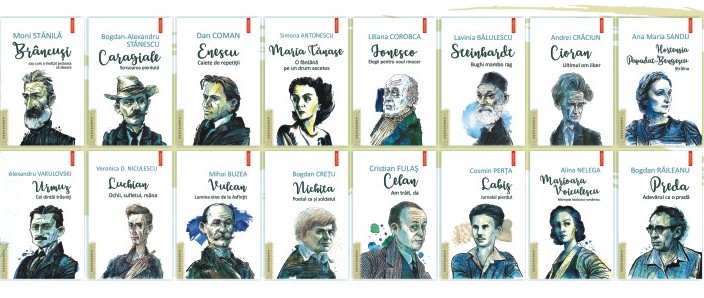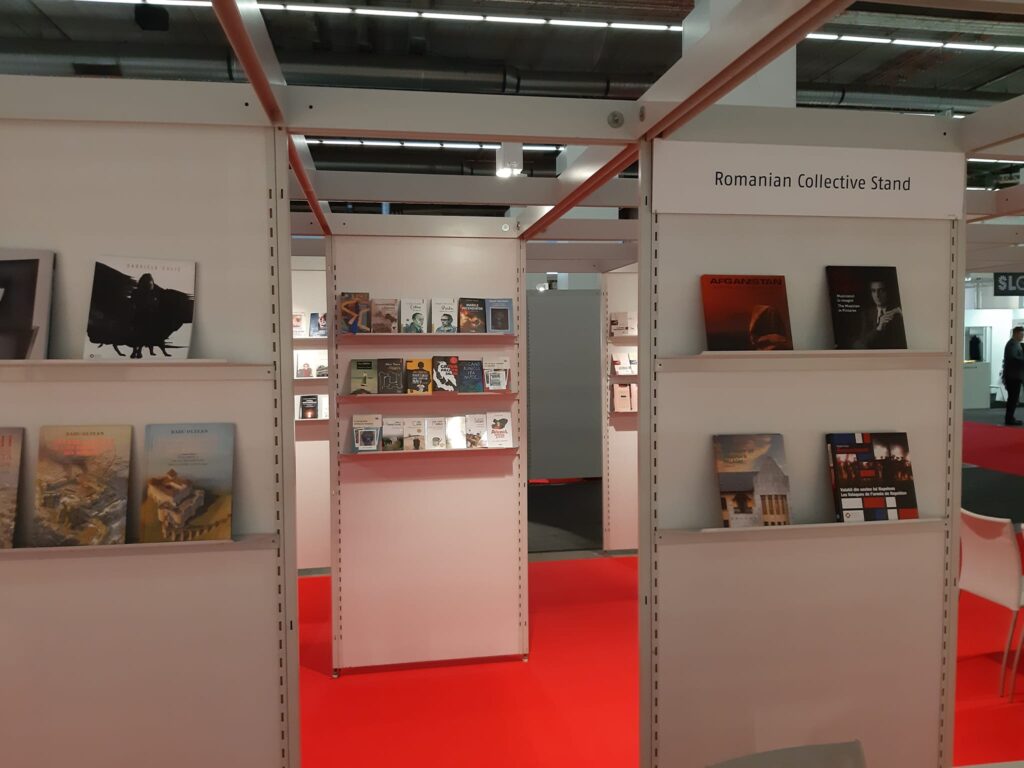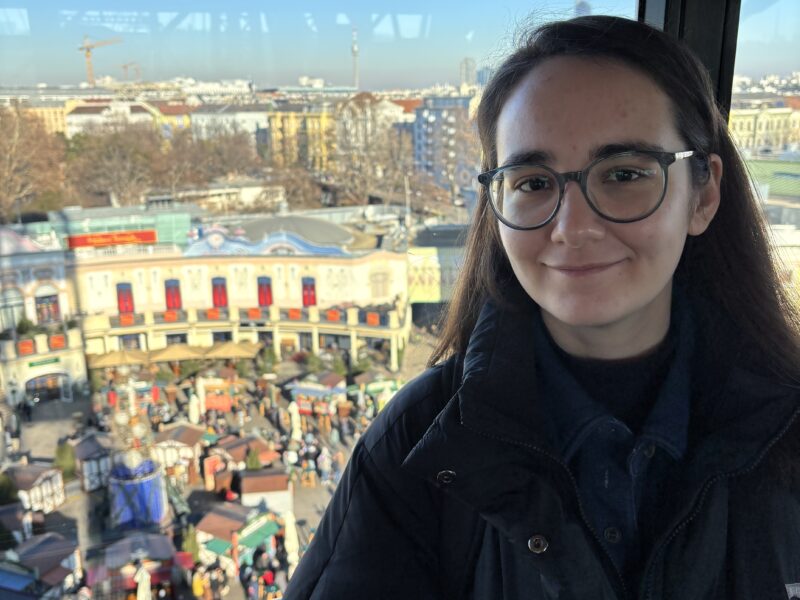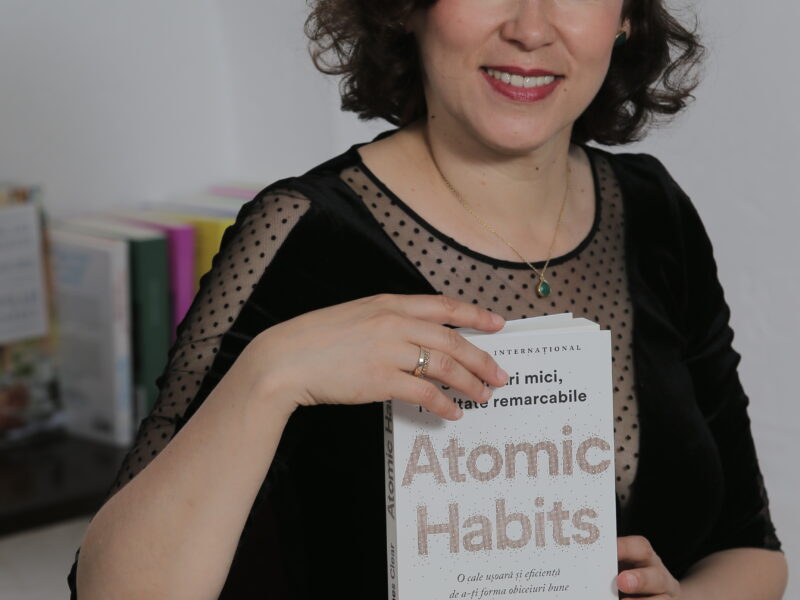Adrian Botez is editor-in-chief at Polirom Publishing House and coordinates the Romanian fiction collections from Iași. He has had what one may call an organic growth. He started as a proofreader, continued as a copy editor, then as an deputy editor-in-chief, and now he holds the rails of the editorial team, by following the road of a book from manuscript to its launch. Actually, sometimes even from the idea, as in 2019 he initiated the collection „Fictional biographies” and has been growing it since, nourishing it and promoting it with a rare sense of devotion. He talks with the same passion about Romanian fiction at the Romanian and international book fairs, where Adrian Botez searches for editors to enamour with the Romanian authors’ books.
If there were only one sunset in a loopin this world, what book would you read and re-read, until the dog would pull you away from it and take a walk? And then do it all over again?
I thought two days about this question. It is very difficult to choose one when living in a world of books. Nonetheless, I will choose the first that had a serious impact on me, which is 1984 by George Orwell. Although, given the context you described, Ende’s The Neverending Story would fit better. Also, there is no issue with my puppy, she is perfectly patient for her walks.
You started working at Polirom Publishing House as a proofreader and advanced up to editor-in-chief. What did this route look like?
I think it is a normal evolution. What I have learned along the way is that when you get a job at a publishing house, you know nothing, although you think you do. There is an entire learning process (which is not over, at least for me) and I consider it just to advance gradually, as your knowledge grows to be vast and solid. And so, from proofreader I was promoted to copy editor (maybe my most important moment), then to deputy editor-in-chief (the point where one develops an in depth understanding of how a publishing house works, how the book industry works, how important networkingis and so on) and at the same time I started to get involved in the management and evaluation process for Romanian literature manuscripts. The last step came a short while after I started to coordinate a series, Fictional biographies, by circumstance. We shall see what the future brings, but I’m delighted about the fact that, at least up to now, I have not skipped any step. This builds confidence and somewhat diminishes the symptoms of impostor syndrome.
What does a normal workday look like?
It is practically impossible to answer this question, since almost no day is similar to the previous one. It all starts the same way, with a coffee before starting work. However, after walking through the door, it can go anywhere. Sometimes I’m in calls almost all day, other times I am proofreading and copy editing a book that has to go to print urgently, sometimes I approve the Ok to Print, I take care of the catalogues or put the manuscripts in order and the proposals for the Romanian literature or the Fictional biographies series. Actually, sometimes I’m not even in Iași at the start of the workday, but at some book fair or other type of work-related trip.
You deal with some books at the manuscript level, but some you grow since they are but a mere idea planted with care in the heart and mind of some writer (in the case of the Fictional biographies). What is your concrete involvement in the life of a book, and when do you pass it on?
As a continuation of what I was saying above, it differs with each type of book. In the case of Romanian literature, I follow the book at the manuscript proposal step, evaluating it and eventually to its acceptance in the editorial council, until it goes to print (sometimes including the revising step). For the Fictional biographies, it is similar, but the first step is just an idea and the writer accepting this challenge. For all the others, my involvement entails from the copy editing, proofreading, to the Ok to Print (either one, two, or all these steps). Anyway, for all the books that go through the Iași office, the two editors-in-chief are involved in one way or another until it goes to print (and sometimes even after). In the end, one can roughly say that we hand over a book after it is up for sale in bookshops.

You were saying in an interview, a few years ago, about the negotiations you carry with some authors for polishing the manuscripts. You mentioned the logical arguments you use, but also the less rational ones. Who has the last say when you cannot reach an agreement? Were there any “I told you so” cases after publishing?
Basically, the ideal case does not involve a ‘final say’, an ultimatum. This would only underline the image of confrontation between the editor and the author, instead of collaboration. I can’t really recall a negotiation that resulted in a unilateral decision, from any of the parties. Both parties always accept the decisions, even if sometimes it is half-heartedly and I’m sure no one is waiting around the corner with the ‘I told you so’ vindictive bomb. That would be petty. We take responsibility for any book together, with the good and the bad.
How large is the editorial team in charge of Romanian fiction? Do you also work with external collaborators? Where do you recruit new people for employment or for collaborations, taking into account many are complaining about the lack of professionals?
Unfortunately, there is no dedicated team for Romanian fiction. We are a fairly large team of copy editors and proofreaders and we deal with Romanian fiction, as well as non-fiction, for example, international or Romanian. Basically, all the books that the Iași office is in charge of are dealt with by this team, through rotation, without being specialised on a certain field (although, obviously, partiality towards a genre or another inevitably surfaces). For the moment, we do not have external collaborations, since the editorial work involves much more than revising per se, and a lot of back and forth between departments, with correction papers. In consequence, constant physical presence is necessary, for the moment. In order to give a simplified answer to the third question: we recruit where we can. Indeed, the market of professionals in the book industry is getting smaller each year, and so, when given the chance to hire a professional or at least someone who has a solid base and high learning potential, we do not hesitate, whether we get a recommendation or someone simply sends the CV by email to our office.
As editor-in-chief of the Romanian literature collections, you are probably the favourite target for those who have written a book and want to get it published. How do you navigate these messages? Do you read them? Do you offer answers?
Yes, mostly all the Romanian literature manuscripts arrive on my desk and, yes, I do answer everyone (which means I confirm when receiving it, and, if necessary, I ask for further needed materials, and after, generally a long while after, since there are many manuscripts at all times, I send back our answer, whether it is positive or negative). Of course, I have a system for ensuring I don’t miss anything, which involves from paper written notes to digital archives.
A long-awaited moment for the upcoming writers is Polirom’s debut contest. I imagine you receive mountains of manuscripts. How does the selection process work and what are the criteria for selecting the winner?
Indeed, each competition has had many participants, which is as surprising as it is gladdening. The selection is made inside the publishing house and then an appointed jury chooses the winner, grading each manuscript that made the first cut. However, since the manuscripts are anonymised including for me (not to mention for the jury), because they are sent from email addresses specially created by the participants for this competition, without including the name (otherwise they are disqualified), we prefer that the people involved in designating the winner stay anonymous as well, for obvious reasons. The chances of parti prisare null. And the criteria are not necessarily objective, since evaluating literature cannot be done… mathematically. The book that meets all or the most requirements to be a good book (the idea, the quality of the writing etc.) in the point of view of the majority on the jury is declared the winner, plain and simple.
Once an author becomes part of the Polirom portfolio, does the publisher have right of preemption for his next books? Alternatively, looking backwards, does an author have the guarantee that you will also publish his future projects?
The publishing house, of course, has the right of preemption of a published author, such a formality is included in the contract by all publishers, I think. But no, this does not entail an obligation on the publisher’s side to print indefinitely and with no objections all the future manuscripts of the aforementioned author. It would not be right to offer such a blank check to an author, contractually. He could write a very good book, even an excellent book, and after never rise to the same level with his following projects, or the publishing of a manuscript can bring damage to the publishing house, including economical, or it may simply exceed the publisher’s editorial possibilities. It does not happen often, but it can happen.
How do you decide in which collection a book should be included (Ego.Proză vs Fiction LTD) and how does pertaining to a certain collection influence how the book sells, how it and the author are received?
There is more of a generational difference between the two collections. In general, authors with tradition, with a long literary history are published under Fiction LTD, and in Ego.Proză, mainly, the younger generation or those that are at the beginning in our publishing house. However, there are no fixed rules. Since for each book, the author’s profile, the theme of the manuscript etc., are taken into account; and so, the volume can end up in one of the two collections without fulfilling the above-mentioned criteria. Nevertheless, generally, if an author is in Fiction LTD, it is likely all his future prose will be published there.
What does a bestseller mean when referring to the Romanian literature collections of the Polirom publishing house and which books made the cut in this category in the last few years?
I can’t and it would not be fair to nominate certain titles, taking into account the large volume of Romanian literature at Polirom, although some can be implied. Of course, on the Romanian market one can say that book sales are excellent if sold in thousands (more than two thousand, to be fair), and a bestseller is a book that exceeds tens of thousands. It rarely happens, but it certainly does.
Who is the competition for Polirom in terms of Romanian fiction?
At this moment, all publishing houses that publish Romanian literature, whether it is a recent or an old series or imprint. Overall, I would like to think that, at least for now, given that each year there are more and more good Romanian authors, it is not a heavy competition, maybe just for good debut books or young authors. In regards to the traditional authors, I think that things are pretty straightforward and each publisher has a full portfolio, although, of course, there are exceptions and spectacular switches from one publisher house to another, but I would not attribute this necessarily to attempts of “stealing” authors.
Aside from preparing the books for publishing, you also make efforts to get them translated in other languages. At the Frankfurt Book fair, where we met, you had talks with foreign publishers regarding potential rights acquirings. How much interest is there abroad for Romanian literature and how is it received?
Since Romanian literature is not yet broadly known, although it has had numerous translations in the past two decades, at least in the West, with few exceptions, the attitude of foreign editors is a mix of curiosity and skepticism, as it should be. But there are also enough foreign publishing houses that have published Romanian literature and are starting to know it, some editors already know very well what and who they are looking for at such meets, but do not hesitate to throw a glance at the news every year. Sure, since Polirom is not a literary agency and it does not have one, convincing the foreign publishers to consider Romanian authors is rather complicated. Nevertheless, we do our best.

At Frankfurt, you met with editors from all over the world. How do you get in touch? Do you reach out, do they write to you?
I have inherited some, contacts and all, from my predecessors that dealt with these matters, some I searched out (today it is much easier to get contacts, even the Frankfurt Book Fair’s website is helpful in this matter) and even at the fair it can happen to have a spontaneous meeting, unplanned, that becomes a regular in the coming years.
What convinces foreign editors to publish Romanian literature and what are the most “exportable” or sought after titles by foreign editors from Polirom’s portfolio?
It is hard to say, because everyone has a different objective. For example, I met someone who wished to publish only women who write thrillers or detective novels. If your portfolio is missing this, there is no interest. It is so, some search for a certain theme, some for a certain author profile, and others for award winning books. Of course, there are also those that mainly search for financing for translation (I think that the TPS program of the CENNAC is very successful). In consequence, you have to adapt to each editor or agent and try to offer them what they seek. We do not have a raking for translations at Polirom, but there are enough books that have been translated in one country and others to twenty countries.
What is your professional glory moment? Like when the happy dance stole the limelight from the New Zeeland rugby team’s choreography?
I don’t know if I have ever had a Haka moment, but launching the Fictional biographies was pretty close to this.
[The photos are part of Adrian Botez's archive.] [Translated into English by Amalia Nicolăiță.]



